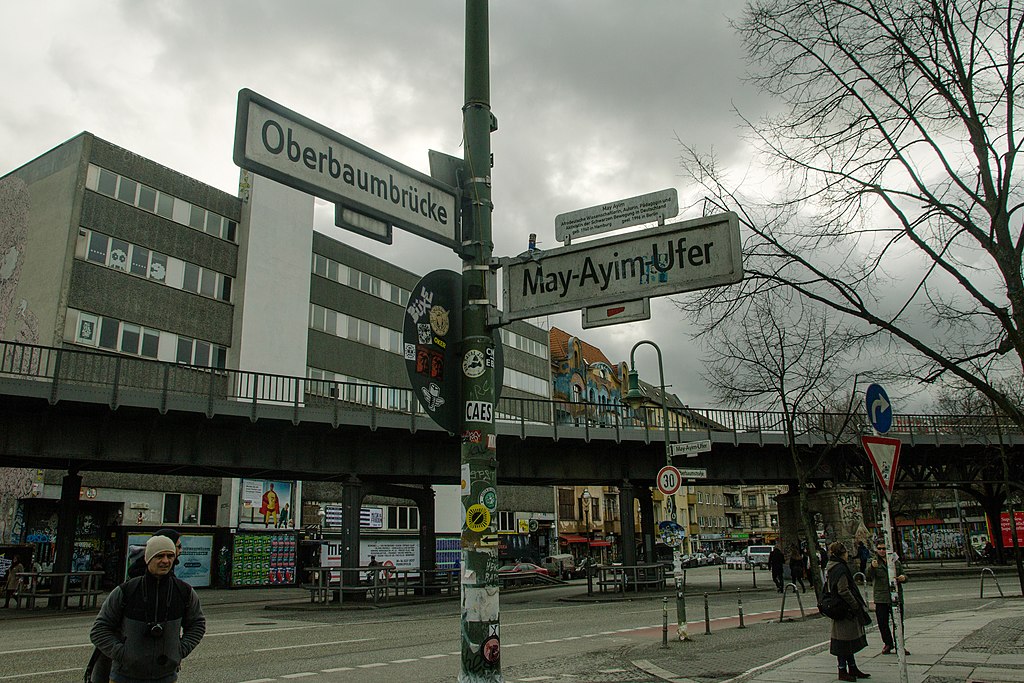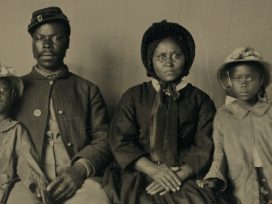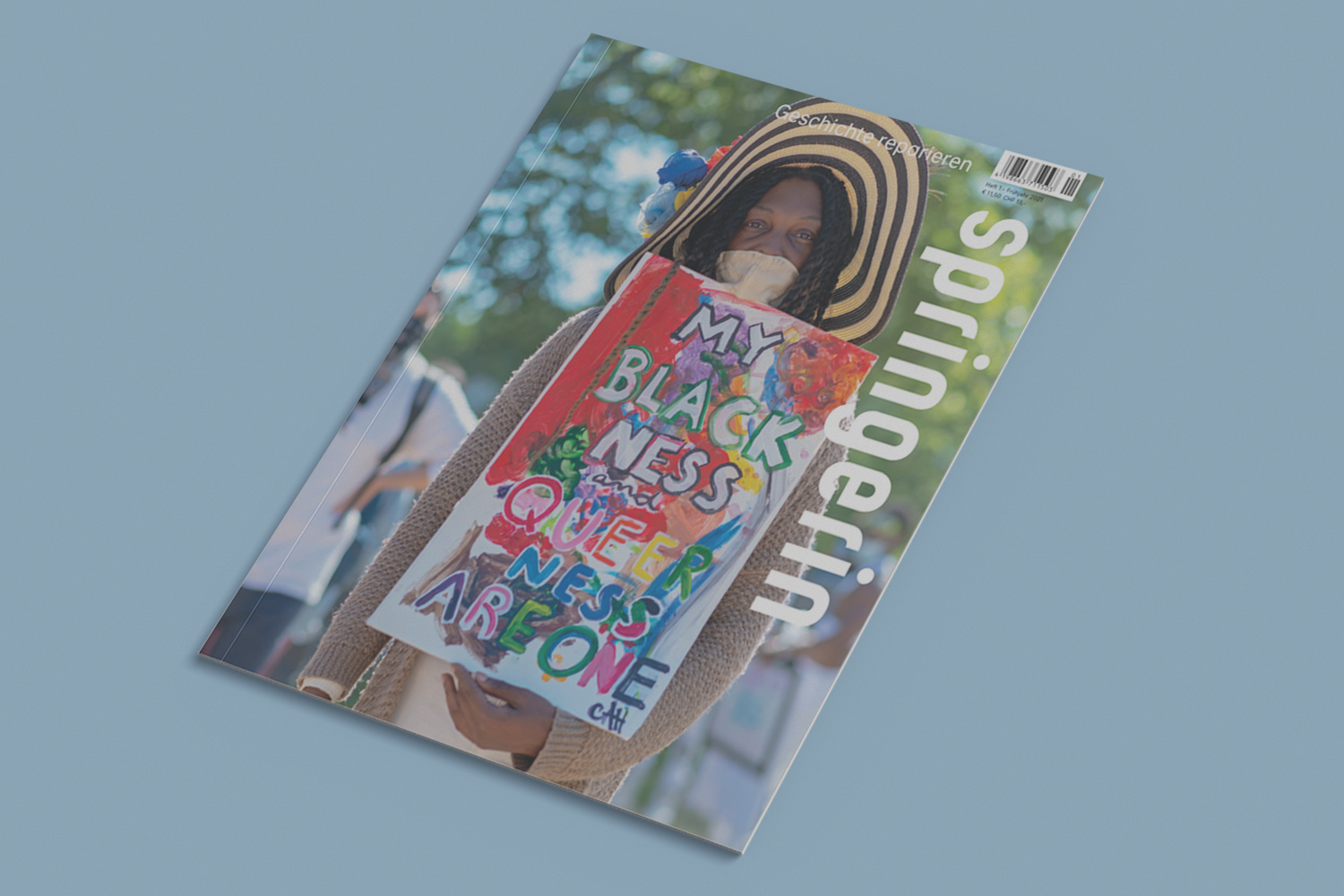
This article was originally published in Eurozine’s Austrian partner journal springerin, issue 1/2021.
I was born in Germany in 1985 and called a foreigner. By 2005 I became a citizen from a migrant background. In 2010 I was a post-migrant, Black in 2012, and now, I suppose, I am BIPoC. Like many others, I am subjected to a wide range of interpellations and checks by cultural institutions and the police.
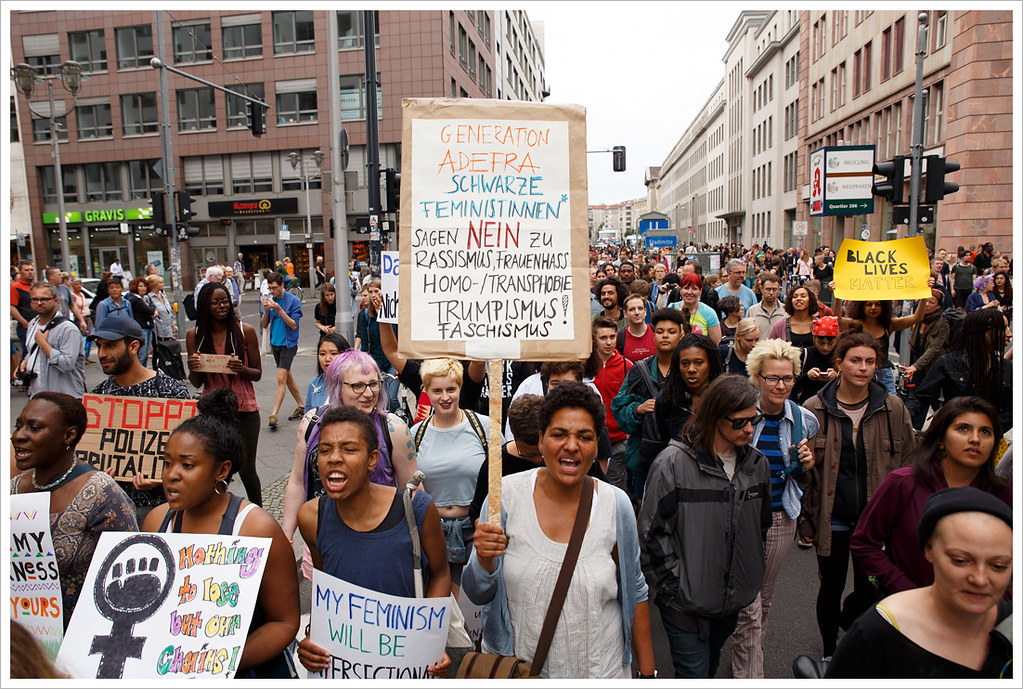
Black Lives Matter Berlin Demostration Foto by Montecruz Photo from Flickr
Discourses migrate. They move with their carriers along flight paths, shipping routes and underwater fibreoptic cables, from harbour to harbour and into new regions and contexts. Their concepts are absorbed, abbreviated, revised and reinterpreted. They are desperately needed, ignored, expanded or rejected. Their texts are read, translated, scanned in, up or downloaded as PDFs and shared on WhatsApp. Experts are hyped up and invited to big cities, medium-sized cities, large cultural institutions, galleries and universities. They run projects, march through institutions or are forgotten. They perform ‘their’ critique. They represent ‘their’ discourse. They become the subject of their own discourse.
Recognition and suffering
I recently met a German journalist who was unwilling to identify as Black. He felt he was too intelligent to simply let discourses impose new identities upon him. He could not hide behind his reading of Foucault, he explained. In my field diary I called him ‘the reluctant black intellectual’. I envied his defiance. He is now doing valuable decolonial work on the canon of German-language philosophy. He has become that Black German journalist he never wanted to be. It’s as if, faced by the horrors of our time, his focus has shifted from a preoccupation with power (Foucault) to a confrontation with violence (Fanon).
Black people in Europe greet each other in the street even if they do not know each other. A Black friend of mine, who was brought up by his white German mother, thinks the greeting is a token of solidarity with the other Black person’s fate. It says: ‘I feel your pain’. Another Black friend, who came to Germany as an asylum seeker, believes that same greeting is a dishonest expression of sympathy: dishonest because it disguises material differences. What, for example, do Black students and a Black tolerated asylum seeker have in common?
This greeting between Black people is often interpreted as a statement of Afrodiasporic culture. I understand it more as a replay, set in quotation marks, of the racist ur-scene that Frantz Fanon described in Black Skin, White Masks, where a white child points to a Black man and says, ‘Mama, see the Negro! I’m frightened!’
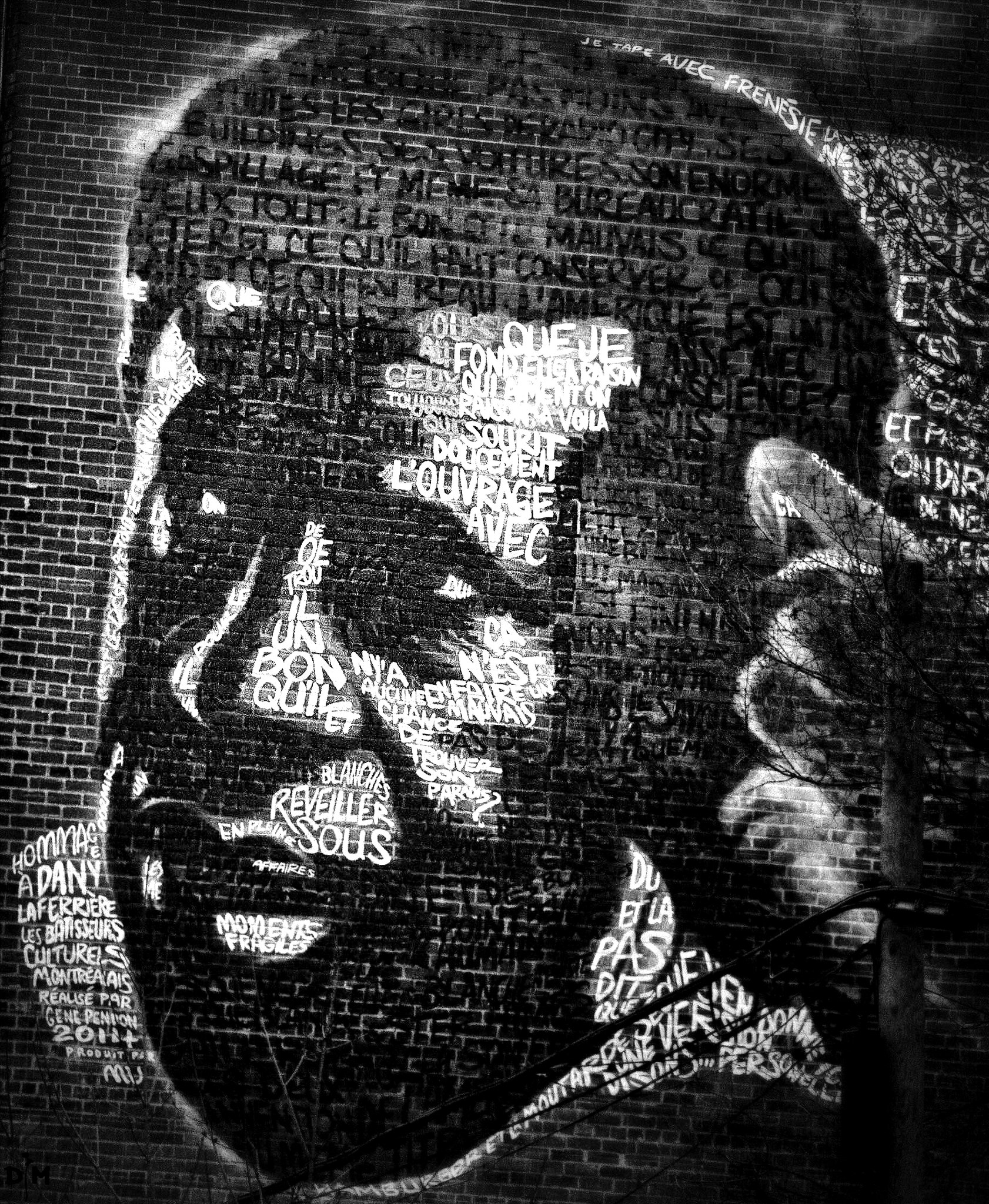
Frantz Fanon – The Wretched of the Earth
Photo by photographymontreal from Flickr
Following Pierre Macherey, we recognize that Black-being emerges out of the child’s imperialist gaze. Fanon’s model of interpellation is visual. Black skin is visible and obvious to everyone. No wonder we deliberately unlearn the ritual street greeting as we move up the social ladder. The fear of how easily a mere glance can interpellate us out of invisibility runs too deep. The existential angst of the ‘nigger moment’ runs deep.
Colonial violence
For the anticolonial pioneer Frantz Fanon, the colonial situation exposed the true nature of the modern state: in the absence of any promise of freedom or representation, the colonial subject experiences its undiluted raw violence and coercion. European workers are confused but the colonized subject sees clearly. But how does the sheer unlimited violence of the historical colonial context relate to a European homeland and present? What is the historical and, therefore, settled relationship between ‘colony’ and ‘homeland’?
The composer Julius Eastman described the phenomenon in the USA in 1980: ‘Without field niggers, you wouldn’t really have such a great and grand economy that we have. So that is what I call the first and great nigger, field niggers. And what I mean by niggers is that thing which is fundamental, that person or thing that attains a “basicness”, a “fundamentalness”.’
I will never forget a conference on American literature I attended in Munich in 2009. I watched, fascinated, as German professors of American studies feted Obama as a symbol of progressive promise and Captain Ahab’s ship Pequod as a ‘third space’, while their African American colleagues kept a polite silence and later, at the buffet, condemned Obama’s nomination of Timothy Geithner for Secretary of the Treasury as a neoliberal betrayal. Discourses are situated praxes; the first Black president of the US means different things to denazified white Germans and committed Black Americans.
American dreaming versus German reality
When asked in 2019 about her life’s ambitions, Angela Merkel replied that as a young woman in the GDR she had dreamed of driving through the Rocky Mountains listening to Bruce Springsteen. Peter Struck, the former German defence minister, who famously said that ‘German security is being defended not only, but also, in the Hindu Kush’, fulfilled his dream of riding Route 66 on a Harley Davidson after he retired. America is a promise.
What the Rockies and Route 66 were for Merkel and Struck, the system of American studies was for me and many other people of colour in Germany: feminism, Latinx, Black America, Film Studies. Fatima El-Tayeb’s Schwarze Deutsche was unavailable and Rainer E Lotz’s Black People: Entertainers of African Descent in Europe and Germany was too obscure, so bell hooks, Eric Lott et al. became the pillars of my thinking. When I wanted to find out more about the history of blackface and minstrel shows, when I wanted to understand why the police always stopped me in Sendlinger-Tor-Platz, when I wanted to think about Blackness as more than just a form of discrimination – in short, whenever I wanted to move forward in my academic or personal investigations – I sought out the American studies library to make sense of modernity.
The consequence of this blind adoption of American antiracist discourses is that we associate racism primarily with Black bodies. We take Eastman’s ‘field niggers’ as the foundation of our own European system. And, yes, the tragic music of Moor Mother et al. is perfectly suited to the fetishization of Black existentialism.
But it works less well with shisha bars and gyms in Duisburg or Offenbach. This focus on the African American experience, this restriction of racism to the colonial situation, blinds us to the racist exploitation taking place on our doorstep. Compared to the huge Black Lives Matter mobilization in the wake of the murder of George Floyd, the reaction in Germany to the far-right terror attack in Hanau was pathetic. We must ask: why does our society not display the same empathy and solidarity towards its own citizens from Kurdish, Turkish, Bulgarian, Bosnian or Afghan migrant backgrounds or members of the Roma and Sinti communities? How limited must our discourses be if we cannot even talk about the racist exploitation of the people who fix our cars, deliver our packages or pick our asparagus?
Rethinking the narrative
Postcolonial or decolonial discourses do make sense but not as dogmas divorced from time and place. They are only meaningful as attempts to develop concepts and terms for understanding specific historical and geographical situations. Perhaps the modern state does not have a fundamental nature to be exposed in colonial contexts. Perhaps there is simply a gap between the raw violence in the colony and the productivity of power in the homeland, and specific constellations in which the former breaks in upon the latter. But perhaps this dualism is also unproductive. Perhaps there are many modernities that resemble each other. And perhaps, amidst this complexity, we need to rethink our assumptions and our reasoning. Publicly rethink. Because: I might be wrong.
This article is taken from the volume AFTER EUROPE – Beiträge zur dekolonialen Kritik, edited by Julian Warner and published by Verbrecher Verlag in April 2021. It was first published in German in Springerin 1/2021.




